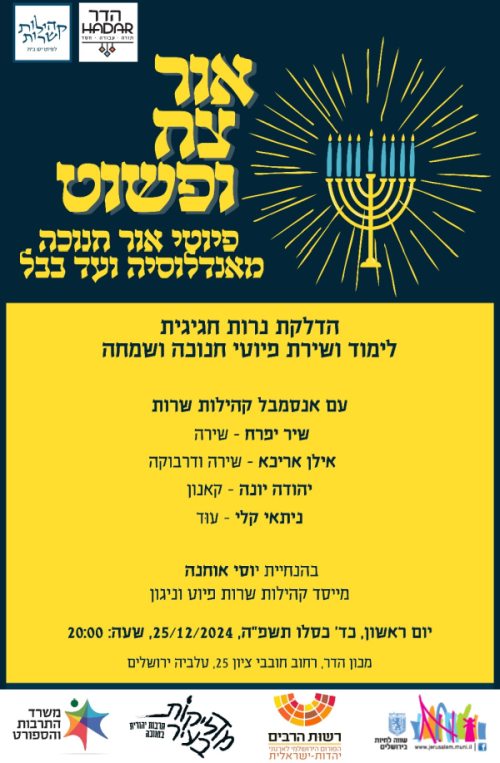Chanukah Concert in Jerusalem1
At Mahon Hadar Bayt le Kehillot Sharot
December 25, 2024

Reviewed by Navah Shemesh2
We were honored to hear the blessings for lighting the Chanukiah with the ancient melodies of Cochin, India at the start of this Chanukah concert organized by informal singing groups in Jerusalem, under the leadership of Yosef Ohayon ben Yaakov. The impression was soft and repetitive, fluid, cyclic, a time to be a part of the greater, infinite essence of the universe. Their ancient Jewish way of praying with the characteristic intonation of Cochin is also the tradition among Yemenite Jews. For example, the kametz katan sounds more like an ‘o’ than an ‘a.’
A reading with Cochin taamei hamikra (tropes, cantillation) of a Psalm describing David doing the Hanukat habait for the Mishkan followed. The taamei ha mikra remind us of the pronunciation of Yemenite and other groups of Jews who had left Eretz Israel at the time of the first exile. David says:
“You are the Lord and I am making you my king, because you created the universe and you listened to me and to my heart. I was mourning because my enemies surrounded me and you helped me to defeat them, you made me happy, and for that I sing of your honor and I know that God will never stop saving me, and I thank you for ever. I invite you all to sing of the memory of his holiness.”
The Chanukah blessings, especially the second one, tell that Hashem did miracles. Then, as is customary, among Ashkenazim today, we sang “Maoz Tzur Yeshuati” to a tune by Handel, a modern song celebrating the victory over the Greeks and the miracle of the oil, reflecting how David had beaten his enemies.
Shlomo Cohen, a nineteenth century Moroccan singer/composer, based the piyyut that followed on David’s words that praise Hashem:
“I elevate you Hashem because you had mercy on me also because I yearned
for you and you healed me,
You did not let my enemies dance from happiness.
You turned my mourning into a dance of joy.”
In this way we connect ourselves through the miracles, the events of the holiday, then and now. In Morocco there was a custom to sing this piyyut for a sick person who had been healed supposedly through a miracle.
The Babylonian piyyut that followed describes the Jewish people as a dove, which connects us to the dove of Noah during the Flood, the dove that symbolized a great promise. We ask Hashem to redeem us with the holiness of Zion, like the dove waiting for the land to be dry, and for salvation to come. This very ancient piyyut from Babylon of the seventh to tenth centuries gaonic period was composed by a poet known only as Yehuda. It was accompanied by the qanun (a stringed instrument). The original maqam came from Persia, then travelled to Turkey and later to Egypt. Each maqam is a key that describes a certain mood, influenced by the text, sad, or happy or full of yearning. In Turkey, a nineteenth century sultan invited a German composer to organize the maqams into notations (keys). Another piyyut, traditionally sung at dawn, was composed by a Rabbi Avraham Yitzhak Antebbe, a kabbalistic rabbi from Aleppo of the nineteenth century. This piyyut describes the fresh transparent light hat descends on us from the kedusha of Hashem, that light is the light of Gan Eden. The light of the menorah reflects this spiritual light.
“Please Hashem,” he says, “return the crown to us as in the old days, bring the Jews from every corner of the world, then like Moses we can praise you as Moses did at the splitting of the sea.”
This conveys the feeling of joy at the miracle of Chanukah together with the expectation of redemption in the future. Each paytan, it seems to me, is like a candle in the hanukiya, each being from a different age and place. Together, they shine like the menorah in the Bet Ha-Mikdash.
Yosef Ohana, the son of Yaakov, has organized events such as this since 2002, to bring the old piyyutim to the attention of new generations, broad, new and diverse audiences and singing communities. He founded the organization Singing Communities in several neighborhoods for the younger generation to rediscover forgotten piyyutim of their parents. The musicians in our concert were a drummer, (origin Yemen) kanun-player (origin Baghdad), oud-player (a musician of Ashkenazi origin who loves Eastern music), and a female singer whose parents were from Morocco. The audience was from the Singing Communities, different communities, and a contingent of Moroccan Jews visiting from France. Their enthusiasm was shared by all, and the audience joined in most of the piyyutim, being linked together by piyyutim from far-flung communities that all met in Jerusalem to celebrate the first light of Chanukah.
1Two audio clips from the concert:
![]() ;
;
![]() .
.
2 Navah Shemesh was born in Jerusalem, pre1967, to parents who emigrated from Baghdad. Navah studied classical and Spanish guitar in the Jerusalem Music Academy, Hebrew literature at the Hebrew University, art at Emuna College, and Arabic music at the College for Music from the East, an institution which reflects the common ground between Arabic music and piyyutim.
Copyright by Sephardic Horizons, all rights reserved. ISSN Number 2158-1800
